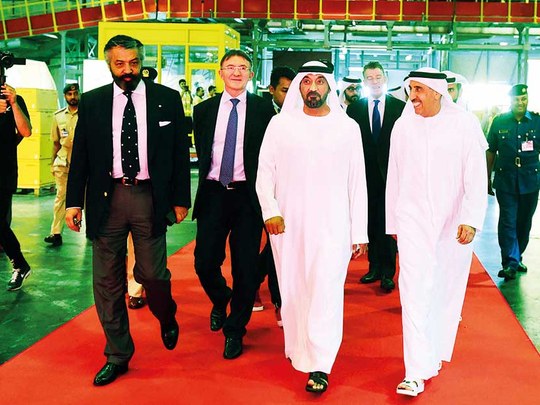
DUBAI
DHL Express’s $18 million expansion for its hub at Dubai International Airport was opened on Thursday by Shaikh Ahmad Bin Saeed Al Maktoum, President of Dubai Civil Aviation and Chairman and Chief Executive of Emirates Airline and Group, exactly 20 years after he opened the original hub.
The expansion nearly doubles DHL’s building space, from 3,950 square metres to 7,180 sq m, and increases its capacity from 2,500 shipments per hour to 5,000 shipments per hour.
The expansion opens at a time when DHL Express global CEO Ken Allen, who began his DHL career in Dubai in 1985, sees a bright future for logistics, with an expanding market and limited competition.
“In the international express business now there’s only really three players left — ourselves, UPS, FedEx,” Allen said in an interview with Gulf News. “And UPS and FedEx are great companies. UPS is probably the most efficient service company in the world and FedEx, they were the first company to win the Malcolm Baldridge Quality Award.
“All of us, we compete on quality and service. But it’s a business with very high barriers to entry. First of all, you have to spend a lot of money to maintain a network in every country in the world. We’re spending a billion a year in Express on capex, and FedEx and UPS are spending something similar.
“But the growth in this market is so massive that no one player can keep up.”
Allen attributed the growth in express services not only to the recovery of global trade, but to the increasing demand fuelled by e-commerce, particularly through Alibaba, Amazon and, locally, Souq.com.
“Everybody talks about Amazon. Amazon is a big customer of ours, we do a lot of business with them and they’re not in competition with us, I don’t think. The reason they do some things themselves is nobody can keep up with the pace of the packages that they’re generating.
“So for us, we’re in a fantastic situation ... Us, as suppliers, we’re going to ride that boom.”
He added, “This really could be the trigger for the world to have, for the next five years, say, a Renaissance and a boom. We’ve never had it so good for about 20 years.”
The Middle East, Allen said, was a microcosm of the wider world in this sector, and he praised Dubai’s Aramex for being ahead of the game. “They’ve done a fantastic job. They probably saw the e-commerce opportunity before most other people did.”
He added, “All this stuff couldn’t be any better for a place like Dubai, which believes in digitalisation, which believes in Big Data, the city of the future. And it’s a regional trading hub. And it encourages entrepreneurialism. It’s all here. Dubai should benefit massively.”
Allen backed Alibaba founder Jack Ma’s idea of an Electronic World Trade Organisation (EWTO), geared to smaller firms and start-ups, alongside the World Trade Organisation (WTO).
“He wants to create an environment where an entrepreneur in Bolivia can sell to an entrepreneur in Sweden, and the entrepreneur in Sweden can sell to an entrepreneur in Vietnam. Small business-to-business opportunities.”
In such a system, Allen said, the only loser would be the traditional middleman — producers would get more for their creations, end customers would pay a cheaper price.
Hub expansion
DHL’s new hub expansion also includes on-site customs clearance, with new X-ray screening and other security measures, with automatic sorting for up to 120,000 parcels a day.
“I think people underestimate how technologically advanced the logistics business is. I mean, right from the start we’ve always said that the information is as important as the package. If we’re sending shipments from Dubai to Papua New Guinea we need to pre-alert Papua New Guinea customs that this stuff is arriving, when it’s going to be there so we can get it cleared as quick as possible.
“We’re invoicing in every single currency in the world, we’re invoicing around the world, we’ve got a global brand name that’s in every country around the world, so our use of digital technology, digital marketing and everything else is pretty advanced.
“But the big thing about digitalisation, where we see opportunity for the whole world is that technically, now, in this day and age, everyone in the world can be connected to everybody else. It’s never been technically possible before — it still isn’t now, because not everybody’s got access to broadband or a mobile. But more and more people do have.
“We’re seeing it right now. Hundreds of thousands of small businesses ... If you’re a small business you can put your product online and if someone in Nigeria likes it, through our system, through our network, we can create you an export market like that. That never used to happen before. It used to be a slow, gradual expansion.”










